Everything You Need to Know About Feeding Your German Shepherd Puppy:
Today I will explain Which Foods Are Good for Your German Shepherd Puppy.
Hello dog lovers,I am Dr. Arif aziz. Feeding your German Shepherd puppy the right food is super important! Just like us, puppies need proper nutrition to grow up strong and healthy. Their little bodies are growing and developing every day, so giving them the right food is key to helping them reach their full potential.

Hey there! Welcome to our blog all about picking the perfect food for your German Shepherd puppy. We know how overwhelming it can be with so many options out there, but don’t worry, we’ve got your back. Our goal here is to give you all the guidance you need to choose the ideal food that will keep your furry friend happy, healthy, and thriving. So let’s dive in and find the best food for your lovable German Shepherd puppy.
Firstly Understand Your German Shepherd Puppy’s Dietary Needs:
- What Your Puppy Needs: Okay, so let’s talk about what your German Shepherd puppy needs to eat. They’re growing like crazy, so they need lots of good stuff in their food to help them grow up strong and healthy. That means they need protein for their muscles, fats for their brain development, and all sorts of vitamins and minerals to keep everything working smoothly.
- Picking the Right Food: When it comes to choosing food for your German Shepherd puppy, there are a few things to think about. First off, consider their age – puppies have different nutritional needs than adult dogs. Then, think about their size and activity level – bigger, more active puppies might need more calories than smaller, more laid-back ones. And don’t forget to check the ingredients to make sure you’re getting a portion of food that’s tailored to your puppy’s needs.
- Keeping Your Puppy Healthy: Now, let’s talk about some common health issues in German Shepherd puppies and how their diet can help. Things like hip dysplasia and digestive problems can be a concern for these pups, so it’s important to feed them a diet that supports their joint health and digestive system. Choosing the right food can help prevent these issues and keep your puppy feeling their best.
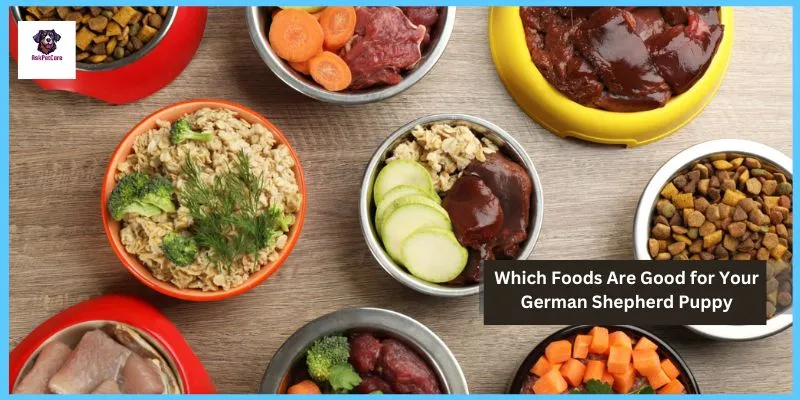
Now Evaluating Different Types of Puppy Foods:
- Types of Puppy Food: Alright, let’s break it down! There are three main types of puppy food: dry kibble, wet canned food, and raw diets. Dry kibble is like little crunchy nuggets, wet canned food is, well, wet and soft, and raw diets consist of uncooked meats, bones, and veggies.
- Pros and Cons: Each type of puppy food has its perks and drawbacks. Dry kibble is convenient and can help keep your puppy’s teeth clean, but some pups may find it boring. Wet canned food is super tasty and can be easier for picky eaters to enjoy, but it can be more expensive and spoil faster. Raw diets are often seen as the most natural option and can be great for your puppy’s health, but they require careful preparation and handling to ensure they’re balanced and safe.
- Best Choice for German Shepherd Puppies: So, which type of food is best for your German Shepherd puppy? Well, it really depends on your puppy’s preferences and your lifestyle. Dry kibble is a popular choice for its convenience and dental benefits, but if your puppy prefers wet food or thrives on a raw diet, those can be great options too. Ultimately, the best type of food is one that meets your puppy’s nutritional needs and that they enjoy eating.

Now explore Transitioning Your German Shepherd Puppy to New Food:
- Introducing New Food: When you’re switching your German Shepherd puppy to a new food, it’s important to take it slow. Start by mixing a small amount of the new food with their old food, gradually increasing the ratio of new to old over about a week or so. This helps prevent digestive upset and allows your puppy’s tummy to adjust to the change.
- Keeping an Eye on Your Puppy: As you transition to the new food, keep a close watch on your puppy’s response. Monitor their stool consistency, energy levels, and overall well-being. If you notice any signs of digestive upset, like diarrhea or vomiting, slow down the transition process or consult your vet for guidance.
- Adjusting Portions and Schedule: Once your German Shepherd puppy has fully transitioned to the new food, you may need to adjust their portion sizes and feeding schedule accordingly. Every puppy is different, so pay attention to their hunger cues and body condition to determine the right amount of food to give them. And don’t forget to stick to a consistent feeding schedule to help regulate their digestion and prevent overeating.
Frequently Asked Questions about Which Foods Are Good for Your German shepherd Puppy:
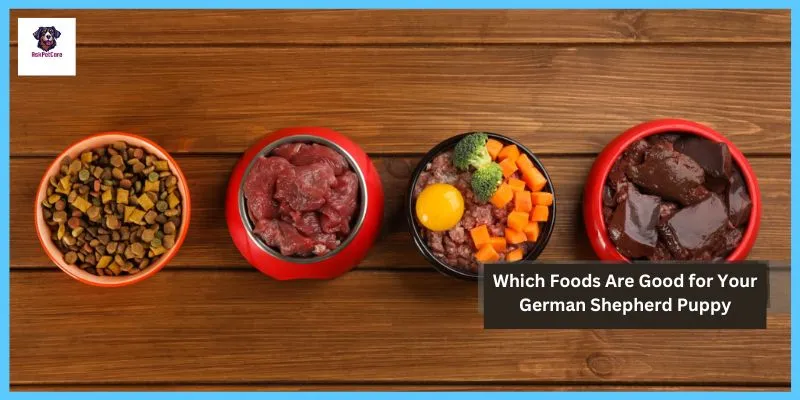
- Answering Common Questions: Let’s tackle some of the questions you might have about feeding your German Shepherd puppy. Worried about how much to feed them? Wondering if you’re giving them the right food? Curious about how often to feed them? We’ve got answers to all these questions and more to help you feel confident about nourishing your furry friend.
- Expert Advice for New Owners: Feeding your German Shepherd puppy can feel like a big responsibility, especially if you’re a new puppy owner. But don’t worry – we’re here to help! Our expert advice and guidance will give you the knowledge and tools you need to make informed decisions about your puppy’s nutrition. From choosing the right food to establishing a healthy feeding routine, we’ve got you covered every step of the way.
Conclusion:
- Summing It Up: So, let’s recap what we’ve covered in this blog. We talked about the importance of proper nutrition for German Shepherd puppies and how to understand their specific dietary needs. We explored different types of puppy food and offered tips for transitioning your puppy to a new diet. Plus, we addressed common questions and concerns about feeding German Shepherd puppies.
- Final Recommendations: When it comes to feeding your German Shepherd puppy, our final recommendation is to choose a high-quality puppy food that meets their nutritional needs and suits their preferences. Take your time to transition them to new food gradually and monitor their response closely. And remember, consistency is key when it comes to feeding schedules and portion sizes.
- Prioritizing Your Puppy’s Health: As a pet owner, it’s essential to prioritize your puppy’s nutrition for a healthy start in life. Providing them with a balanced diet and proper care sets the foundation for their overall well-being and longevity. So, keep up the good work, and continue to give your furry friend the love and attention they deserve.
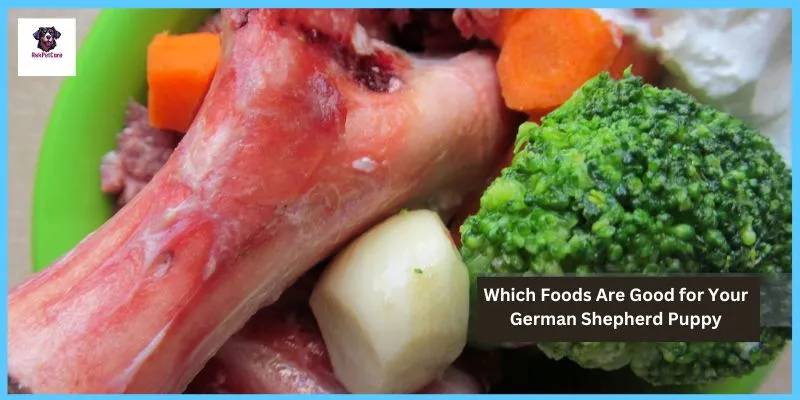
Five dog food brands that are commonly recommended for German shepherd puppies:
- Royal Canin German Shepherd Puppy
- Eukanuba German Shepherd Puppy
- Hill’s Science Diet Puppy Large Breed
- Blue Buffalo Wilderness Puppy
- Taste of the Wild High Prairie Puppy Formula
These brands offer specially formulated puppy food tailored to the nutritional needs of large-breed puppies like German Shepherds. Always ensure to choose a puppy food that meets the Association of American Feed Control Officials (AAFCO) standards and consult with your veterinarian for personalized recommendations based on your puppy’s specific needs.
At what age puppy stop mother milk feeding?
Puppies typically stop nursing from their mother’s milk between the ages of 6 to 8 weeks old. During this time, they start transitioning to solid food and rely less on their mother’s milk for nutrition. However, it’s essential to note that the weaning process can vary depending on factors such as the health of the mother dog, the size of the litter, and individual puppy development. It’s crucial to monitor the puppies’ progress and provide them with a gradual transition to solid food under the guidance of a veterinarian or experienced breeder.
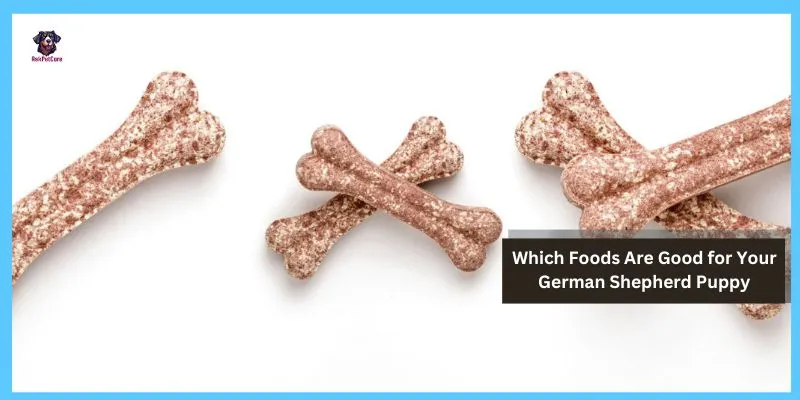
Wet dog food recipe suitable for puppies, containing essential ingredients for their growth and development:
Homemade Wet Puppy Food Recipe:
Ingredients:
- Lean ground turkey or chicken: Provides high-quality protein for muscle development.
- Brown rice or quinoa: Offers carbohydrates for energy and essential nutrients.
- Sweet potatoes: Rich in fiber, vitamins, and minerals for overall health.
- Carrots: A source of beta-carotene, vitamins, and antioxidants for immune support.
- Spinach: Contains iron, calcium, and vitamins for bone and muscle development.
- Eggs: Provide additional protein and essential fatty acids for coat and skin health.
- Coconut oil: Offers healthy fats for brain development and a shiny coat.
- Bone broth or low-sodium chicken broth: Adds moisture and flavor to the food.
Instructions:
- In a large pot, cook the ground turkey or chicken until fully cooked.
- Add cooked brown rice or quinoa to the pot and stir to combine.
- Mix in chopped sweet potatoes, carrots, and spinach.
- Crack eggs into the mixture and stir well to incorporate.
- Add a spoonful of coconut oil for additional nutrition.
- Pour in bone broth or low-sodium chicken broth to create a moist consistency.
- Simmer the mixture on low heat for about 10-15 minutes, stirring occasionally.
- Allow the homemade wet puppy food to cool completely before serving to your puppy.
Note: Before introducing any homemade food to your puppy’s diet, consult with your veterinarian to ensure it meets their nutritional requirements and to address any specific dietary concerns or restrictions.
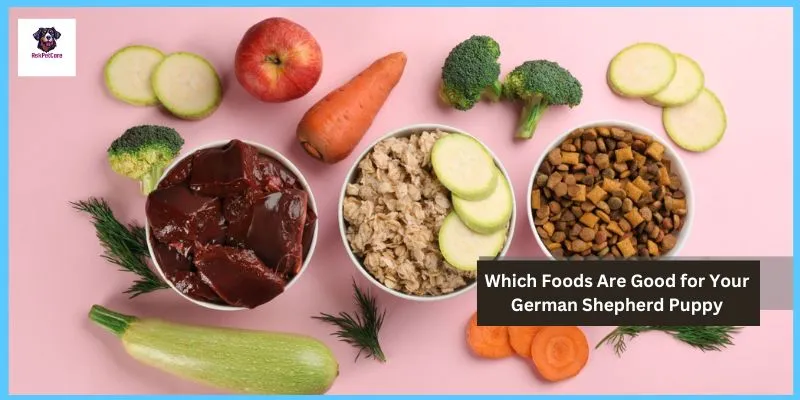
what age puppy development period end:
The development period of a puppy typically ends around 18 to 24 months of age, although it can vary depending on the breed and individual dog. During this time, puppies go through various stages of growth and development, including physical, mental, and social changes. By the age of 18 to 24 months, most puppies have reached their full adult size, their bones have finished growing, and they have developed their adult teeth. However, it’s important to note that certain large breeds, like German Shepherds, may continue to mature and develop up to 3 years of age or even longer. Additionally, ongoing training and socialization are essential during this period to ensure the puppy becomes a well-adjusted and well-behaved adult dog.
Fifteen dog food brands suitable for German Shepherd puppies, along with their important ingredients:
| Brand Name | Important Ingredients |
| Royal Canin German Shepherd Puppy | Chicken, Brown Rice, Oat Groats, Chicken Fat, Fish Oil, Beet Pulp, Vegetable Fibers, Dried Tomato Pulp, Psyllium Seed Husk, Vitamins, Minerals |
| Eukanuba German Shepherd Puppy | Chicken, Chicken By-Product Meal, Corn, Ground Whole Grain Sorghum, Brewers Rice, Fish Meal, Dried Beet Pulp, Fish Oil, Vitamins, Minerals |
| Hill’s Science Diet Puppy Large Breed | Chicken Meal, Whole Grain Wheat, Whole Grain Oats, Whole Grain Sorghum, Chicken Fat, Chicken Liver Flavor, Fish Oil, Flaxseed, Vitamins, Minerals |
| Blue Buffalo Wilderness Puppy | Deboned Chicken, Chicken Meal, Pea Protein, Fish Meal, Tapioca Starch, Chicken Fat, Flaxseed, Menhaden Fish Meal, Sweet Potatoes, Vitamins, Minerals |
| Taste of the Wild High Prairie Puppy Formula | Buffalo, Lamb Meal, Sweet Potatoes, Egg Products, Pea Protein, Peas, Potatoes, Canola Oil, Roasted Bison, Roasted Venison, Fruits and Vegetables, Vitamins, Minerals |
| Wellness Complete Health Puppy | Deboned Chicken, Chicken Meal, Oatmeal, Salmon Meal, Ground Barley, Ground Brown Rice, Canola Oil, Flaxseed, Tomatoes, Carrots, Sweet Potatoes, Vitamins, Minerals |
| Purina Pro Plan Focus Puppy Large Breed | Chicken, Rice, Corn Gluten Meal, Whole Grain Wheat, Poultry By-Product Meal, Whole Grain Corn, Beef Fat, Fish Oil, Dried Egg Product, Fish Meal, Vitamins, Minerals |
| Nutro Wholesome Essentials Puppy | Chicken, Chicken Meal, Whole Brown Rice, Brewers Rice, Split Peas, Chicken Fat, Lamb Meal, Flaxseed, Salmon Meal, Pea Protein, Vitamins, Minerals |
| Iams Proactive Health Smart Puppy | Chicken, Ground Whole Grain Corn, Chicken By-Product Meal, Ground Whole Grain Sorghum, Chicken Fat, Dried Beet Pulp, Natural Flavor, Fish Oil, Dried Egg Product, Vitamins, Minerals |
| Diamond Naturals Large Breed Puppy | Lamb Meal, Ground White Rice, Cracked Pearled Barley, Chicken Fat, Fish Meal, Egg Product, Dried Yeast, Flaxseed, Tomato Pomace, Potassium Chloride, Vitamins, Minerals |
| Rachael Ray Nutrish Large Breed Puppy | Chicken, Chicken Meal, Brewers Rice, Soybean Meal, Whole Grain Corn, Corn Gluten Meal, Chicken Fat, Brown Rice, Dried Peas, Dried Plain Beet Pulp, Vitamins, Minerals |
| Victor Select Nutra Pro Active Dog & Puppy Formula | Beef Meal, Whole Grain Sorghum, Chicken Meal, Chicken Fat, Pork Meal, Whole Grain Millet, Yeast Culture, Dried Kelp, Vitamins, Minerals |
| Nulo Freestyle Puppy & Adult Grain-Free Turkey & Sweet Potato Recipe | Deboned Turkey, Turkey Meal, Salmon Meal, Chickpeas, Chicken Fat, Sweet Potatoes, Yellow Peas, Deboned Flounder, Apples, Carrots, Vitamins, Minerals |
| Canidae All Life Stages Multi-Protein Formula | Chicken Meal, Turkey Meal, Lamb Meal, Brown Rice, White Rice, Rice Bran, Peas, Potatoes, Ocean Fish Meal, Chicken Fat, Sun-Cured Alfalfa, Vitamins, Minerals |
| Orijen Puppy Grain-Free Dry Dog Food | Chicken, Turkey, Eggs, Atlantic Flounder, Whole Atlantic Mackerel, Chicken Liver, Turkey Liver, Chicken Heart, Turkey Heart, Whole Atlantic Herring, Whole Red Lentils, Whole Pinto Beans, Whole Green Lentils, Whole Green Peas, Whole Chickpeas, Vitamins, Minerals |
These ingredients are essential for providing balanced nutrition tailored to the needs of growing German Shepherd puppies.

Now illustrating the approximate daily food requirements for puppies in grams until they reach adulthood:
| Puppy Weight (lbs) | Puppy Weight (kg) | Daily Food Intake (grams) |
| Up to 5 lbs (2.3 kg) | Up to 2.3 kg | 75 – 150 grams |
| 5 – 10 lbs (2.3 – 4.5 kg) | 2.3 – 4.5 kg | 150 – 300 grams |
| 10 – 20 lbs (4.5 – 9 kg) | 4.5 – 9 kg | 300 – 600 grams |
| 20 – 30 lbs (9 – 13.6 kg) | 9 – 13.6 kg | 600 – 900 grams |
| 30 – 40 lbs (13.6 – 18.1 kg) | 13.6 – 18.1 kg | 900 – 1200 grams |
These amounts are general guidelines and may vary depending on factors such as the puppy’s age, activity level, metabolism, and specific dietary needs. It’s crucial to monitor your puppy’s growth and adjust their feeding amounts accordingly to maintain a healthy weight and condition. Additionally, always provide fresh water for your puppy to drink.
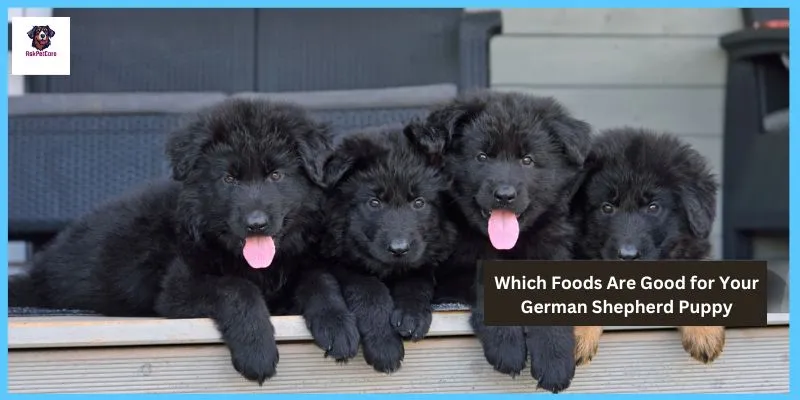
Now illustrating the approximate monthly food requirements for puppies in grams until they reach adulthood:
| Age (Months) | Daily Food Intake (grams) |
| 1 | 50 – 75 grams |
| 2 | 75 – 125 grams |
| 3 | 125 – 200 grams |
| 4 | 200 – 250 grams |
| 5 | 250 – 300 grams |
| 6 | 300 – 350 grams |
| 7 | 350 – 400 grams |
| 8 | 400 – 450 grams |
| 9 | 450 – 500 grams |
| 10 | 500 – 550 grams |
| 11 | 550 – 600 grams |
| 12 | 600 – 650 grams |
| 13 | 650 – 700 grams |
| 14 | 700 – 750 grams |
| 15 | 750 – 800 grams |
| 16 | 800 – 850 grams |
| 17 | 850 – 900 grams |
| 18 | 900 – 950 grams |
| 19 | 950 – 1000 grams |
| 20 | 1000 – 1050 grams |
| 21 | 1050 – 1100 grams |
| 22 | 1100 – 1150 grams |
| 23 | 1150 – 1200 grams |
| 24 | 1200 – 1250 grams |
These amounts are general guidelines and may vary depending on factors such as the puppy’s age, breed, activity level, metabolism, and specific dietary needs. It’s crucial to monitor your puppy’s growth and adjust their feeding amounts accordingly to maintain a healthy weight and condition. Additionally, always provide fresh water for your puppy to drink.
Fifteen essential ingredients must be found in high-quality German Shepherd puppy food:
- Animal Protein: Chicken, turkey, beef, lamb, or fish provide essential amino acids for muscle development.
- Whole Grains: Brown rice, oatmeal, barley, or quinoa offer carbohydrates for energy and fiber for digestion.
- Healthy Fats: Chicken fat, fish oil, or flaxseed provide omega-3 and omega-6 fatty acids for skin, coat, and brain health.
- Fruits: Apples, blueberries, or cranberries offer antioxidants and vitamins for immune support.
- Vegetables: Carrots, spinach, or peas provide vitamins, minerals, and fiber for overall health.
- Eggs: Whole eggs offer high-quality protein, vitamins, and minerals for growth and development.
- Sweet Potatoes: Rich in beta-carotene, fiber, and vitamins for digestion and immune support.
- Salmon Meal: A source of protein, omega-3 fatty acids, and DHA for brain and eye development.
- Chicken Meal: Concentrated protein source for muscle development and maintenance.
- Dried Beet Pulp: Provides fiber for digestive health and regulates bowel movements.
- Flaxseed: Source of omega-3 fatty acids for skin, coat, and joint health.
- Brewer’s Yeast: Contains B vitamins and minerals for overall health and energy metabolism.
- Kelp: Provides iodine and trace minerals for thyroid function and metabolism.
- Chicken Liver: Rich in vitamins A and B, iron, and protein for overall health.
- Probiotics: Beneficial bacteria for gut health and immune system support.
These ingredients are carefully selected to meet the nutritional needs of growing German Shepherd puppies and support their overall health and well-being.
Simple table featuring ten brands each of dry kibble, wet food, and raw diet options suitable for German shepherd puppies:
| Dry Kibble | Wet Food | Raw Diet |
| Royal Canin | Merrick | Primal |
| Hill’s Science Diet | Wellness | Stella & Chewy’s |
| Blue Buffalo | Natural Balance | Instinct |
| Purina Pro Plan | Instinct | Nature’s Variety |
| Wellness Core | Blue Buffalo | Nulo Freestyle |
| Taste of the Wild | Hill’s Science Diet | Darwin’s |
| Orijen | Royal Canin | Raw Feeding Miami |
| Canidae | Purina Pro Plan | Bravo! |
| Diamond Naturals | Nutro | Vital Essentials |
| Nutro | Iams | Northwest Naturals |
These brands offer a variety of options in each category tailored to the nutritional needs of growing German shepherd puppies.
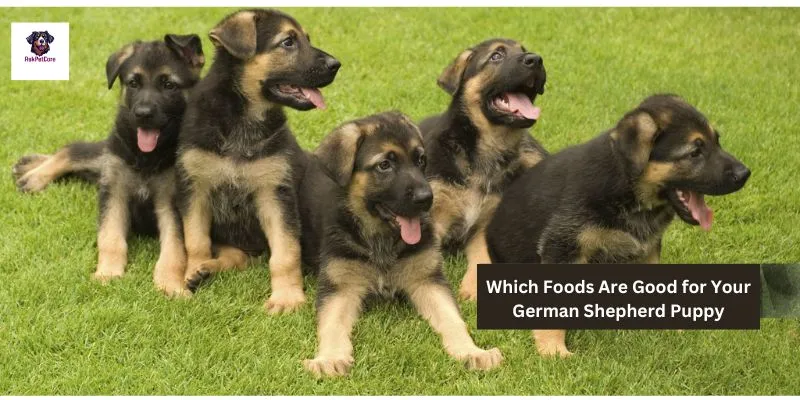
The number of times a puppy should eat in a single day depends on their age:
- Up to 3 months old: Puppies younger than 3 months typically need to eat about four meals a day to meet their high energy and growth requirements.
- 3 to 6 months old: As puppies grow, you can gradually reduce the number of meals to three times a day.
- 6 to 12 months old: From 6 months to 1 year of age, most puppies can transition to eating two meals a day.
- After 1 year old: Once a puppy reaches 1 year of age, they can usually maintain a healthy diet with two meals a day, though some owners prefer to continue feeding three smaller meals if their puppy has a large appetite or is very active.
It’s essential to divide the daily portion of food into multiple meals to avoid overloading the puppy’s stomach and to maintain steady energy levels throughout the day. Always consult with your veterinarian for personalized feeding recommendations based on your puppy’s age, breed, size, and individual needs.
How much to feed a German Shepherd puppy by weight:
Feeding a German Shepherd puppy by weight is essential to ensure they receive the appropriate amount of food for their growth and development. Here’s a general guideline for feeding a German Shepherd puppy based on their weight:
- Up to 10 lbs (4.5 kg): Feed approximately 1/2 to 1 cup (50-100 grams) of puppy food per day, divided into multiple meals.
- 10 to 20 lbs (4.5 to 9 kg): Feed around 1 to 2 cups (100-200 grams) of puppy food per day, divided into multiple meals.
- 20 to 50 lbs (9 to 23 kg): Feed approximately 2 to 3 cups (200-300 grams) of puppy food per day, divided into multiple meals.
- 50 to 80 lbs (23 to 36 kg): Feed about 3 to 4 cups (300-400 grams) of puppy food per day, divided into multiple meals.
- Over 80 lbs (36 kg): Feed around 4 to 5 cups (400-500 grams) of puppy food per day, divided into multiple meals.
Remember, these are general guidelines, and the exact amount of food needed may vary based on factors such as the puppy’s age, activity level, metabolism, and individual dietary requirements. It’s crucial to monitor your puppy’s growth and adjust their feeding amounts accordingly to maintain a healthy weight and condition. Always consult with your veterinarian for personalized feeding recommendations.
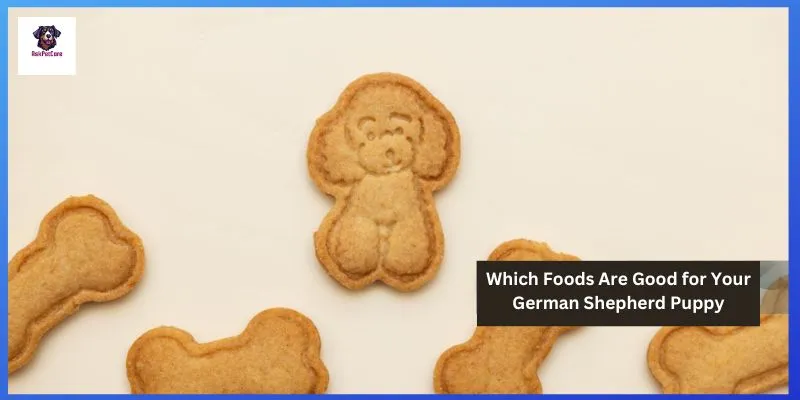
Now explore the Best wet food for German shepherd puppy:
When selecting wet food for a German Shepherd puppy, it’s essential to consider their specific nutritional needs for growth and development. Here are some key factors to consider and some recommended wet food options:
- High-Quality Ingredients: Look for wet food made with high-quality ingredients, such as real meat (chicken, beef, lamb, etc.) as the first ingredient. Avoid products with fillers, by-products, or artificial additives.
- Balanced Nutrition: Ensure that the wet food provides a balanced diet with appropriate levels of protein, fat, carbohydrates, vitamins, and minerals to support your German Shepherd puppy’s growth and energy needs.
- Life Stage Appropriateness: Choose wet food specifically formulated for puppies. These formulations typically contain higher levels of essential nutrients required for growth and development compared to adult formulas.
- Digestibility: Opt for wet food that is easily digestible to support your puppy’s sensitive digestive system.
- Trusted Brands: Select wet food from reputable brands that have a history of producing high-quality pet foods and adhere to strict quality control standards.
Here are some popular wet food options suitable for German Shepherd puppies:
- Blue Buffalo Wilderness Grain-Free Puppy Chicken Recipe
- Wellness CORE Grain-Free Puppy Formula
- Taste of the Wild High Prairie Puppy Formula
- Merrick Grain-Free Puppy Plate Recipe
- Hill’s Science Diet Puppy Chicken & Barley Entrée
- Royal Canin German Shepherd Puppy Canned Dog Food
Remember to transition your puppy gradually to any new food to avoid digestive upset. Additionally, consult with your veterinarian for personalized recommendations based on your puppy’s individual needs and dietary requirements.
Which food is good for German shepherd puppies in India?
In India, several dog food brands offer options suitable for German Shepherd puppies. Here are some popular choices:
- Drools
- Royal Canin
- Pedigree
- Hill’s Science Diet
- Farmina N&D
- Arden Grange
- Eukanuba
- Orijen
- Taste of the Wild
- Acana
These brands offer a variety of options, including dry kibble, wet food, and raw diet formulations, designed to meet the nutritional needs of German Shepherd puppies. It’s essential to choose a high-quality puppy food that provides balanced nutrition and is appropriate for your puppy’s age, size, and activity level. Always consult with your veterinarian to determine the best food for your German Shepherd puppy based on their individual needs.
Best food for German Shepherd puppies in India:
In India, several high-quality dog food brands offer suitable options for German Shepherd puppies. Here are some of the best food options available:
- Royal Canin German Shepherd Puppy
- Drools Focus Super Premium Puppy Food
- Pedigree Pro Puppy Large Breed
- Farmina N&D Grain-Free Puppy Food
- Hill’s Science Diet Puppy Large Breed
- Orijen Puppy Large Breed
- Acana Puppy Large Breed
- Taste of the Wild High Prairie Puppy Formula
- Arden Grange Large Breed Puppy Food
- Canine Creek Puppy Large Breed
These brands provide formulations specifically tailored to the nutritional needs of German Shepherd puppies, including balanced protein and fat levels, joint support ingredients, and essential vitamins and minerals. It’s essential to choose a food that suits your puppy’s individual preferences, dietary requirements, and any specific health considerations. Additionally, always consult with your veterinarian for personalized feeding recommendations based on your German Shepherd puppy’s age, weight, activity level, and overall health.
How much should a German shepherd eat a day:
“German Shepherds generally need about 2 to 3 cups of food per day, split into two meals. However, the exact amount can vary depending on factors like age, size, activity level, and metabolism. It’s essential to monitor your dog’s weight and adjust their portion sizes accordingly to maintain a healthy body condition. Consulting with your veterinarian can help determine the right amount of food for your German Shepherd based on their individual needs.”
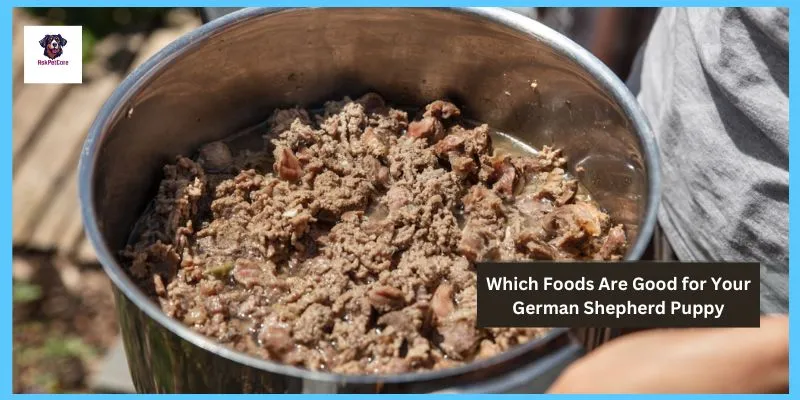
Indian homemade food for German shepherd puppy:
Homemade Chicken and Rice Dog Food:
Ingredients:
- 2 cups of cooked chicken (boneless and skinless)
- 1 cup of cooked brown rice
- 1/2 cup of cooked vegetables (carrots, peas, green beans, etc.)
- 1 tablespoon of olive oil (optional for added healthy fats)
- 2 cups of water or low-sodium chicken broth
Instructions:
- Cook the chicken thoroughly until there’s no pink inside. You can boil, bake, or grill it. Once cooked, chop it into small, puppy-sized pieces.
- Cook the brown rice according to the package instructions. Make sure it’s fully cooked and soft.
- Cook the vegetables until they are tender. You can steam or boil them. Chop them into small pieces once cooked.
- In a large bowl, mix together the cooked chicken, rice, and vegetables. Add a tablespoon of olive oil if desired for extra healthy fats.
- Gradually add water or low-sodium chicken broth to the mixture until you reach the desired consistency. It should be moist but not soupy.
- Allow the homemade dog food to cool completely before serving it to your German Shepherd puppy.
- Store any leftover food in an airtight container in the refrigerator for up to three days. You can also freeze portions for later use.
Remember to consult with your veterinarian before making any significant changes to your puppy’s diet, especially if they have specific dietary requirements or health concerns. This homemade recipe should only be used as a supplement to your puppy’s regular diet and not as their sole source of nutrition.

Question: What should I feed my German Shepherd puppy?
A balanced diet consisting of high-quality puppy food formulated for their specific nutritional needs is ideal for your German Shepherd puppy.
Question: Can German Shepherd puppies eat raw meat?
While some people advocate for raw diets, it’s essential to consult with a veterinarian to ensure proper nutrition and safety for your German Shepherd puppy.
Question: How much should I feed my German Shepherd puppy?
Feeding guidelines vary based on factors like age, weight, and activity level. Generally, puppies should be fed several small meals a day until they’re around six months old.
Question: Are grains okay for German Shepherd puppies?
Grains like rice and oats can be included in a German Shepherd puppy’s diet, but it’s essential to choose high-quality, easily digestible options and monitor for any adverse reactions.
Question: When should I switch my German Shepherd puppy to adult food?
Typically, German Shepherd puppies can transition to adult food around 12-18 months of age, but this may vary based on individual growth and development. Consult with your vet for personalized advice.
Here are some reference books that are considered authoritative on the topic of dog care, including nail care:
- “The Complete Dog Owner’s Manual” by Dr. Bruce Fogle
- “The Ultimate Guide to Dog Care: Everything You Need to Know to Keep Your Dog Happy and Healthy” by Amy Marder and Andrew Luescher
- “The Veterinarians’ Guide to Natural Remedies for Dogs: Safe and Effective Alternative Treatments and Healing Techniques from the Nations Top by Martin Zucker
Disclaimer: I hope you will be satisfied if still have any queries contact me. thanks. This is my personal information you must contact your vet for more..
